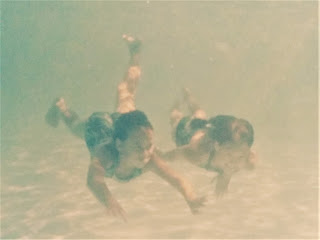Embracing an Athletic Identity
“Come on, Ali, you’ve got this. You can do this,” my dad
urges.
Me, through thick sobs: “I CAN’T.”
He looks at me with a bit of hopeless exasperation, but
tries to stay positive. This is the umpteenth time I’ve done this to him, my
high school cross country coach, my mother. The formula goes something like
this: Start running, hit mile 2-3, start cramping up, start hyperventilating,
start walking, start crying and insisting I can’t do it. Despite being able to
chase a ball across a soccer field for hours at a time, I can’t ever muster the
attention span or inner peace needed to go on a simple 30-45 minute jog. I had
it set in my head that I wasn’t cut out for endurance sports. I wasn’t the
athletic or coordinated child, I was the nerd child who just didn’t have the
competitive edge.
Growing up, I watched my sister Mia kill it in every sport
she tried. She had tenacity, a fire inside that I had never discovered. She was
a talented runner, she could throw a ball, and in the pool, she was a force to
reckon with. Somehow, in the process of growing up with her, I had decided that
not being as fast as her meant I was not born to be an athlete. This manifested
itself in a very defeatist attitude, and even physical ailments when it came to
competition. The moment things got too difficult, or the second I could see
that I was being beaten, something would magically cramp up, somehow it would
become hard to breathe, and somehow, I had to stop right then and there. I
often stunted my own athletic growth by never taking an honest shot at giving
my all. And to me, that was okay, because as a scrawny 17 year old, running around aimlessly didn’t seem to serve much of a purpose anyway.
Things didn’t start to change until college. I was under a
lot of stress. Engineering school was hard. And I’ll admit, I gained weight
freshman year being exposed to Texas BBQ for the first time J. I started to run on
my own to try to keep my weight in check and to relieve stress. I can remember
the first time I texted my mom to tell her I had run around the entire campus
(about 4.5 miles) without stopping. I was really proud of myself. Through this
process, running became more and more of an essential part of my sanity; it was
my happy place. 4.5 miles soon turned to 8, and I would run before big tests to
bring my stress levels down. The summer after my freshman year, I ran my first
half marathon. I still had it in my head that I wasn’t athletic, that I was a
slow runner, but I was changed that day. I remember the euphoric
high of crossing the finish line with my mom and how I wore the soreness in my
legs like a badge of honor.
 |
| My mom, her running partner, Nan, and I before Slacker Half Marathon |
My sophomore year, I joined the Texas A&M Triathlon
Team. I didn’t own a bike, but figuring that my dad was a triathlete, and I
already knew how to run and swim, I decided I would purchase a “practice only”
membership to stay in shape. I spent the next month sucking wind and
trying to keep up with a team that seemed to have all of the athleticism in the
world. Slowly, I worked myself up from dead last to last 1/3 of the pack.
Still, in my mind, I wasn’t athletic. I wasn’t really a triathlete, and I was
here to make the others feel better about themselves. Despite this, I was
encouraged into buying a road bike and signing up for my very first triathlon,
Kemah Sprint.
I was excited, but more than that, I was so scared. I feared
not finishing, falling off my bike, and I had never swam open water before. I
raced Kemah Triathlon almost exactly 5 years ago. It was a warm ocean swim, a
ride on the highways, and a 5k on the Kemah Boardwalk. To my surprise (and no
one else’s), I finished! I swallowed a lot of water in the ocean waves, I
learned about the “brick” sensation in my legs when I fell over trying to run
straight off the bike for the first time, and I felt like hurling when I
crossed the finish line. Despite this, the only thought in my mind was,
That was a blast. I
can do this faster. I want to do it again.
 |
| Me crossing the finish line so photogenically at my first tri |
Unfortunately, things did not go according to plan. I found
out the day after my graduation from Texas A&M that my mom had Stage IV
lung cancer and was given two years to live. I entered a pretty deep
depression. Training for this race seemed pointless, selfish even, when I could
be spending precious time with my mom. So that’s what I did, I threw training
to the wind, and race day came all too quickly.
Boulder 70.3 still stands as my most painful race to date. I
won’t get into too much detail but I essentially pushed too hard on the swim
and bike with an out-of-shape body, and by the time I reached the run, my legs
were spent, I was fighting nausea, and I was reduced to walking. After the
first 6 miles of “running”, I saw my parents up ahead in their lawn chairs. My
dad got up, ran to my side, and started jogging beside me. I started sobbing.
“I can’t do this. Let’s just get in the car and go home.”
“You can do this Ali, you’re doing great. We’re so proud of
you!”
“But, Dad, I’m walking so much of this. You’re gonna have to
wait another two hours for me to come back around to the finish."
“We’ve got sunscreen and granola bars. We’ll see you in two
hours then.”
My dad wasn’t gonna let me quit. I wiped my tears, and after
silencing the high school version of me, I managed to jog the entire second lap
and collect my finisher’s medal. That was a big lesson for me. Racing
triathlons is painful no matter what. Some days, racing feels flat out awful.
It’s important to take a step back and evaluate whether these feelings are all
in your head or whether you truly do need to stop. A lot of times, you may not
need to stop as much as you need to slow down and ride the suckiness until it
passes. Endurance racing is so often riddled with mood swings, ups and downs,
feeling awesome and feeling like Sh%*. If anything, this has only been
solidified in the races I’ve run since, including a slogfest 6 hour trail
marathon. Sometimes, those lows hit and you have to think about just putting
one foot in front of the other, focusing on your breathing, your posture, or
just repeating this is fine in your
head over and over.
 |
| The moment when this conversation actually happened |
 |
| Are we done yet? Moab Trail Marathon |
I mostly wrote this brief history of my triathlon life for
myself, but what is the takeaway here? In 5 years of tri, I’ve transformed from
a meek “non-athlete” who quit at the tip of a hat, to a confident triathlete who refuses to back down
unless there’s a legitimate threat of injury. The past 5 months of Ironman
training have been a major challenge. I’m starting to feel the fatigue more and
more, but I keep striving every day to do the things that will make me more
prepared for the race.
There have been times when that high school girl comes
back to my head to tell me I can’t do this; that I won’t finish this Ironman
and I’m not cut out for it. I tell her quietly that I CAN do this, I WILL do
this, and I won’t quit. I still can’t throw a ball (I can’t fix being
uncoordinated), but I’m an athlete who has worked hard and earned every right
to toe the line in June, regardless of my speed. I have developed the patience and drive to work
through whatever adversity or challenge gets thrown my way on June 11th. I’m ready.
 |
| New suit! Now you know what to look for on the Ironman Boulder course! |






Comments
Post a Comment